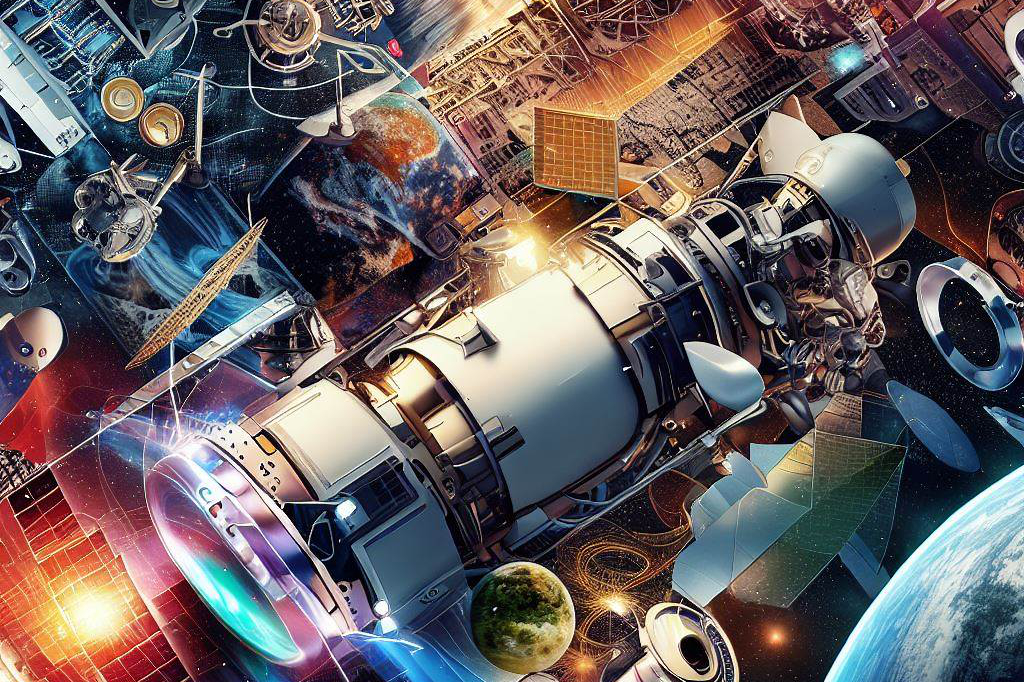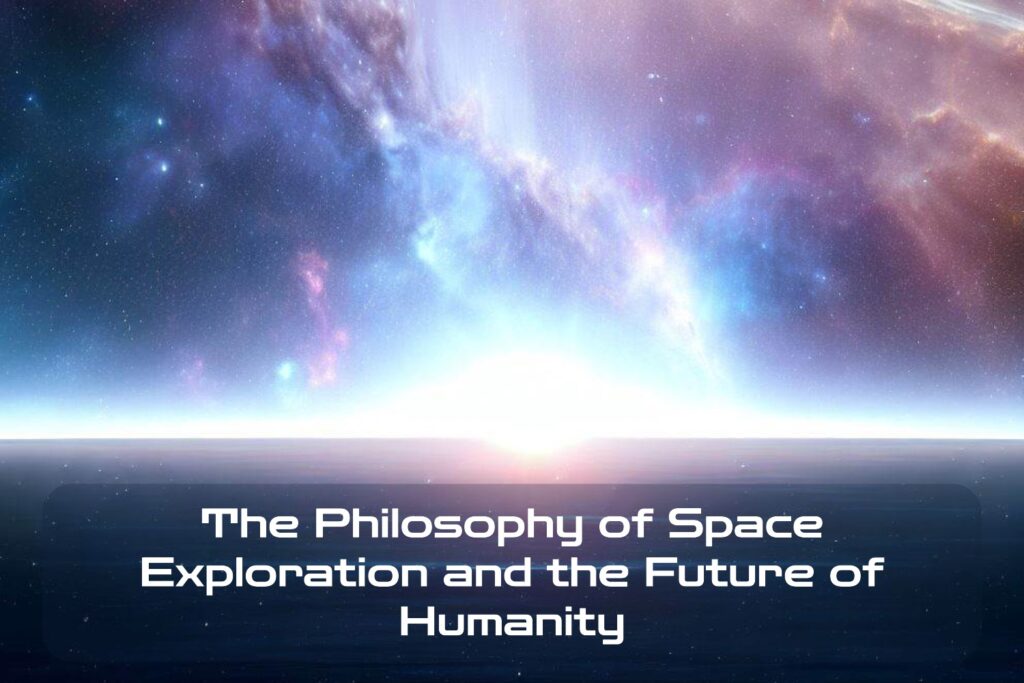The Power of Exploration
Exploration has been a fundamental part of humanity since the beginning. We’ve always been curious about what lies beyond our horizons, and this curiosity has driven us to explore every corner of our planet. But over time, our scope expanded to include the vast wonders of space.
Humans have been fascinated by the stars ever since we first gazed up at them in wonder. And now, as technology advances at an unprecedented rate, we’re able to explore beyond our planet like never before.
Why Do We Explore?

The reasons for exploration are many and varied. Some see it as a way to expand human knowledge; others see it as a means to escape from Earth’s problems or find new solutions to old ones.
Still, others view it purely as an adventure or an act of discovery. Regardless of why we explore, there’s no denying that space exploration has had a powerful impact on humanity.
Our Cosmic Destiny
As we look toward the future, it’s clear that space exploration will continue to play a vital role in humanity’s development. The challenges and opportunities presented by space travel are numerous and complex, but one thing is certain: they’re too important for us to ignore. When we ponder our cosmic destiny – when we consider all that lies beyond our planet – we’re forced to confront some big questions:
What is humanity’s purpose?
Where do we fit into the vast expanse of the universe?
What does our future hold?
These aren’t easy questions to answer, but they’re essential ones if we are truly going to understand ourselves and our place in the cosmos. In this article, we’ll delve into these questions and explore some possible answers.
We’ll examine the philosophy behind space exploration and why it’s so important for us to keep pushing the boundaries of what’s possible. We’ll also discuss the benefits and challenges of space exploration, as well as some of the exciting possibilities that lie ahead.
Whether you’re a seasoned space enthusiast or just someone who’s curious about our place in the universe, this article is for you. So, let’s embark on this journey together and ponder our cosmic destiny!
The Benefits of Space Exploration
Advancements in Technology and Innovation: Beyond Our Wildest Dreams

Space exploration has been a catalyst for some of the most significant technological advancements and innovations in human history. From the development of modern satellite technology to advancements in rocketry, space exploration continues to push the boundaries of what we think is possible.
NASA’s famous Apollo program was responsible for developing cutting-edge technology that led to the development of CAT scans, water filtration systems, and even cordless tools.
These technological achievements would not have been possible without ambitious goals such as landing on the moon. Even today, space exploration continues to inspire new innovations.
For example, SpaceX’s Falcon rockets have revolutionized reusability in rocketry by landing them back on Earth after use, making space travel more efficient and affordable.
The International Space Station (ISS) also serves as a testbed for new technologies with limitless potential.
Scientific Discoveries and Advancements in Medicine: Curing Diseases & Understanding The Universe
Space exploration has also changed our understanding of our universe and ourselves through scientific discoveries. By exploring other planets or moons, we have developed a deeper understanding of physics, astronomy, geology, and other scientific disciplines.
Moreover, space exploration has allowed us to conduct research that directly benefits humans on Earth. In 1985 alone, NASA conducted over 2,500 experiments related to human health aboard the Space Shuttle Columbia.
These experiments led to numerous medical breakthroughs, such as bone density tests that can detect osteoporosis early on. In addition to this experimental work being done by NASA scientists today on microgravity effects on health issues like Alzheimer’s disease or cancer treatments with potential cures for future diseases that could affect people worldwide.
Economic Benefits: Creating Jobs & Boosting Industry Growth
Space exploration is not just about science; it’s also about creating jobs and boosting economic growth. NASA’s budget is roughly $20 billion, and a significant portion of its funding goes towards small businesses, universities, and research institutions.
These beneficiaries use the funding to create new technologies, products, or services that can be commercialized.
Space exploration also creates jobs directly.
The Apollo program alone created over 400,000 jobs in the United States in fields such as engineering, manufacturing, and construction. Today, private companies like SpaceX have also been providing new opportunities for people who are interested in space exploration careers.
Space tourism is another area where we have seen great interest from entrepreneurs who are looking to capitalize on this growing industry. Perhaps one day we will see luxury hotels and resorts in space!
The Ethics of Space Exploration
The impact on the environment and sustainability

As humans, we have a responsibility to be stewards of the Earth and protect its natural resources. However, the very act of space exploration can have a significant impact on our planet’s environment. Launching rockets into space releases harmful emissions into the atmosphere, which can contribute to air pollution and climate change.
Additionally, debris from satellites and other spacecraft can fall back to Earth and cause damage to ecosystems. To mitigate these impacts, space agencies have developed regulations and guidelines for responsible launch practices.
This includes using cleaner fuels for rockets and designing spacecraft with deorbiting capabilities to prevent orbital debris. As we continue to explore space, it’s important that we prioritize sustainable practices that minimize our impact on Earth.
The potential exploitation of extraterrestrial resources
As we venture further into space, there is no doubt that we will encounter valuable resources on other planets or asteroids. However, the question arises: who has the right to these resources? Should they be considered common property or subject to ownership by individual countries or companies?
The potential for extraterrestrial resource exploitation raises ethical concerns about colonization and imperialism in space. It’s crucial that we approach this issue with caution and consideration for all parties involved.
We must ensure that any resource extraction is done in a way that is sustainable and does not harm any extraterrestrial life or ecosystems. As exciting as space exploration may be, we cannot ignore the potential ethical implications that come with it.
We must prioritize sustainability in our launch practices and approach resource exploitation with care and consideration for all involved parties. By doing so, we can ensure a responsible future for humanity’s cosmic destiny.
The Future of Humanity in Space
Colonization and Terraforming: Engineering a New Home

The idea of colonizing other planets has been a science-fiction staple for decades, but in recent years, it has become more than just a dream. The possibility of terraforming and modifying the atmosphere of other planets to be hospitable to humans is now within reach.
Mars is the most obvious target for colonization due to its proximity and similarities to Earth. If we can establish a long-term presence on Mars, it could become our second home, allowing us to continue thriving as a species even if something catastrophic happens on Earth.
Terraforming is an intricate process that involves transforming an entire planet into something livable for humans. It may take many years, if not centuries, to complete such an endeavor.
However, once completed, the benefits would be immense. Terraformed planets would give humanity the chance to start anew with renewed resources and opportunities.
Interstellar Travel and Communication: Exploring Beyond Our Solar System

Exploring our solar system is one thing; exploring beyond it is another entirely.
Interstellar travel – that which allows us to traverse the vast distances of space between stars – remains one of the great technological challenges facing humanity today.
The problems are legion: how do we build ships capable of sustaining life on multi-decade journeys?
How do we communicate across such vast distances?
What will be awaiting us when we get there?
One common suggestion for interstellar communication has been through laser beams or sending probes with messages encoded in binary code or some other language using electromagnetic waves. Unfortunately, at present, there is no way we can expect anyone or anything else out there in space to receive these signals unless they are actively looking for them.
The Search for Extraterrestrial Life: Shattering Our Cosmic Loneliness

One of the great questions that has puzzled humanity since the dawn of time is whether we are alone in the universe. The prospect of life on other planets could potentially have a profound impact on how we view ourselves and our place in the cosmos. Whether it be through microbial life or intelligent beings, the discovery of extraterrestrial life would shatter our cosmic loneliness and open up new possibilities for exploration and interaction.
The search for extraterrestrial life has been ongoing for decades. NASA, SETI, and numerous other organizations have been involved in initiatives to uncover signs of intelligent life.
There have been many false alarms over the years, but that hasn’t stopped us from searching. As technology advances and methods improve, we may one day find definitive proof that we are not alone in the universe.
Challenges to Space Exploration
Technological Limitations and Risks

Space exploration is a challenging endeavor that requires advanced technology and innovative solutions. However, there are various technological limitations that can hinder the progress of space exploration. One of the biggest technological limitations is the current lack of efficient propulsion systems for interstellar travel.
The current propulsion systems are slow and require a lot of fuel, which makes it difficult to reach distant planets and stars within a reasonable timeframe. Another challenge in space exploration is the risk involved in exploring unknown territories in space.
Astronauts face various risks, such as exposure to radiation, isolation, and psychological challenges. Additionally, there is always a risk of equipment malfunction or failure in space, which could result in catastrophic consequences.
Despite these challenges, scientists and engineers are continuously developing new technologies to overcome these obstacles. For example, NASA’s Artemis program aims to develop new propulsion systems such as nuclear thermal propulsion that would allow astronauts to travel faster and further than ever before.
Funding Challenges and Political Obstacles

Space exploration is an expensive undertaking that requires significant funding from governments and private companies. However, funding for space exploration can be affected by political changes or budget cuts.
For example, NASA’s budget has fluctuated over the years depending on the priorities of each administration. Political obstacles can also hinder progress in space exploration.
International cooperation is essential for achieving ambitious goals such as human missions to Mars or beyond. However, geopolitical tensions or conflicting interests can create barriers to international cooperation.
To overcome these challenges, it is important for governments and private companies to invest in long-term plans for space exploration that are not dependent on short-term political priorities or budget cycles. Additionally, international collaboration should be encouraged through diplomatic efforts so that humanity can work together towards achieving common goals in space exploration.
Final Thoughts
Reflection on the significance of space exploration for humanity’s future

As we look towards the future, it is clear that space exploration will have an enormous impact on our society. From technological advancements to scientific discoveries, space exploration has the power to shape our understanding of the universe and drive progress in numerous fields. By exploring the final frontier, we are pushing the boundaries of human knowledge and expanding our horizons in ways that were once unimaginable.
Moreover, space exploration holds immense symbolic value for humanity. It represents our innate drive to explore, discover and understand.
It speaks to our desire for adventure and discovery, as well as our shared curiosity about what lies beyond our planet. In many ways, space exploration is a testament to human ingenuity and perseverance – qualities that inspire us to keep pushing forward even when faced with seemingly impossible challenges.
Continued exploration, research, and ethical considerations
As we continue exploring space, it is important that we do so with a strong sense of responsibility and ethics. We need to ensure that our actions do not cause harm or damage to the environment or other life forms present in outer space. This requires a commitment to sustainable practices such as recycling materials or developing clean energy sources for long-term missions.
In addition to ethical considerations, continued research into new technologies will be crucial for advancing space exploration efforts. We need innovative solutions such as more efficient propulsion systems or advanced life support systems if we are ever going to achieve some of humanity’s most ambitious goals such as interstellar travel or colonizing other planets.
It’s important that we all recognize how essential continued funding is for these endeavors. While there are certainly challenges facing both public and private sector funding efforts at times; history has shown us time and time again how essential financial backing truly is if any long-term goal like this is ever going to be achieved.
In short, space exploration is both an amazing feat of scientific discovery and a testament to humanity’s drive to explore and push boundaries. With responsible ethics, innovative research, and continued funding; we can continue to make enormous strides in understanding the universe around us while pushing humanity forward into a more connected and exploratory future.
Frequently Asked Questions about the Philosophy and Destiny of Space Exploration
1. What is the philosophy behind space exploration?
– Space exploration is rooted in the human desire to explore the unknown and expand our understanding of the universe.
– It is driven by the philosophical belief that exploration is essential for the progress and advancement of humanity.
– The philosophy of space exploration encompasses concepts such as curiosity, scientific discovery, and the pursuit of knowledge beyond our planet.
2. How does space exploration benefit humanity?
– Space exploration has numerous benefits for humanity. It has led to technological advancements that have improved our daily lives in various ways.
– The research and discoveries made through space exploration have contributed to advancements in medicine, communication, and environmental monitoring.
– Space exploration also inspires future generations, fostering scientific curiosity and innovation.
– Furthermore, it has the potential to provide solutions to global challenges, such as understanding climate change and finding alternative resources.
3. What are the main goals of space exploration?
– The primary goals of space exploration include expanding scientific knowledge, discovering new worlds and celestial bodies, and understanding the origins of the universe.
– Another important goal is to establish a sustainable human presence beyond Earth, such as the colonization of other planets or the establishment of space habitats.
– Space exploration also aims to advance technological capabilities, develop new propulsion systems, and improve our ability to explore and utilize space resources.
4. Is space exploration worth the cost?
– While space exploration requires significant investments, many argue that the benefits far outweigh the costs.
– The advancements and technological spin-offs resulting from space exploration have led to economic growth and job creation.
– Additionally, space exploration serves as a unifying endeavor for humanity, fostering international collaboration and diplomatic relations.
– Furthermore, the knowledge gained through space exploration has practical applications that positively impact various industries and fields of study.
5. How does space exploration relate to the destiny of humanity?
– Space exploration is intricately linked to the destiny of humanity as it expands our horizons and offers the potential for future survival and growth.
– It opens up possibilities for space colonization, which could ensure the survival of our species in the face of potential global catastrophes.
– Space exploration also allows us to address existential questions about our place in the universe and our potential for interstellarcommunication or encounters with extraterrestrial life.
– Ultimately, space exploration shapes our destiny by driving scientific progress, technological advancements, and the expansion of human knowledge.
6. What are the ethical considerations in space exploration?
– Ethical considerations in space exploration revolve around issues such as the preservation of celestial bodies and ecosystems, the impact on indigenous or extraterrestrial life forms, and the responsible use of space resources.
– The potential for commercial exploitation of space resources raises questions about equitable access and the protection of vulnerable ecosystems or celestial bodies.
– Ethical guidelines and international agreements are being developed to ensure responsible and sustainable practices in space exploration.
7. How does space exploration inspire future generations?
– Space exploration serves as a source of inspiration for young people, fueling their interest in science, technology, engineering, and mathematics (STEM) fields.
– It captures the imagination and curiosity of individuals, motivating them to pursue careers in space-related industries or scientific research.
– Space missions, discoveries, and the human endeavor to explore the unknown act as powerful narratives that inspire and engage future generations.
8. How does space exploration contribute to scientific research?
– Space exploration provides unique opportunities for scientific research that cannot be replicated on Earth.
– Microgravity conditions in space allow for experiments that yield insights into fundamental physics, materials science, and biological processes.
– Observatories and telescopes in space offer unobstructed views of the universe, enabling astronomers to study distant galaxies, cosmic phenomena, and the origins of the cosmos.
9. What challenges does space exploration face?
– Space exploration faces various challenges, including the development of advanced propulsion systems to enable faster and more efficient space travel.
– The long-term health effects of space travel on astronauts, such as radiation exposure and physiological changes, need to be better understood and mitigated.
– Additionally, the high costs associated with space missions and the need for international cooperation present logistical and political challenges.
10. How does public perception influence space exploration?
– Public perception plays a crucial role in determining the level of support and funding for space exploration.
– Positive public sentiment towards space exploration encourages governments, organizations, and private companies to invest in space programs.
– Effective science communication and public outreach initiatives help to increase awareness and understanding of the benefits and significance of space exploration.

C M, a seasoned editor, journalist, and consultant, is deeply fascinated by the convergence of technology, space, and the future of humanity.
With a particular interest in transhumanity, futurology, and the philosophical and ethical dimensions of these domains, C M serves as the lead contributor to SpaceSpotlight and TranscendSphere.
When not penning insightful articles on these rapidly evolving fields, C M indulges in their love for podcasts and books, proudly embracing their status as a ‘Happy Nerd Extraordinaire!’



